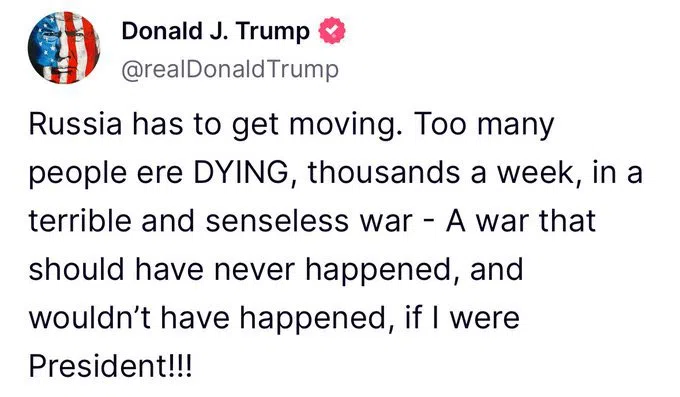Trump tells Russia to ‘get moving’ on Ukraine as US envoy meets Putin
Sign up now: Get ST's newsletters delivered to your inbox

US President Donald Trump's special envoy, Mr Steve Witkoff (left), meeting Russian President Vladimir Putin in Saint Petersburg on April 11.
PHOTO: AFP
MOSCOW – US envoy Steve Witkoff wrapped up his latest talks with Russia’s President Vladimir Putin on April 11, after President Donald Trump urged his Russian counterpart to move quicker to end what he said was the country’s “senseless war” with Ukraine.
Mr Trump has been pressing Moscow and Kyiv to agree on a ceasefire deal but has failed to extract any major concessions from the Kremlin, despite repeated negotiations between Russian and US officials.
The US leader told NBC News in March he was “pissed off” would not tolerate “endless negotiations”
“Russia has to get moving,” Mr Trump wrote on his Truth Social platform, adding that the conflict, which began more than three years ago when Moscow sent troops into Ukraine, was “senseless” and “should have never happened”.
Kyiv and several of its Western allies suspect Russia of stalling the talks on purpose.
Ukraine’s President Volodymyr Zelensky has accused Russia of dragging Beijing into the conflict and on April 11 claimed that hundreds of Chinese nationals
Mr Trump’s post came just before Mr Witkoff’s meeting with Mr Putin at the presidential library in St Petersburg, which state news agencies said lasted 4½ hours.

US President Donald Trump criticised Russia in a Truth Social post.
SCREENSHOT: X
The Kremlin afterwards said only that the meeting had taken place and “focused on various aspects of the Ukrainian settlement”, without elaborating.
Spokesman Dmitry Peskov had earlier said he expected no diplomatic “breakthroughs” from the talks – Mr Witkoff’s third with Mr Putin since February.
He also said “maybe” to a question about whether a possible meeting between Mr Putin and Mr Trump would be discussed.
After their last meeting, Mr Witkoff – a long-time Trump ally who worked with the US President in real estate – said Mr Putin was a “great leader” and “not a bad guy”
The envoy’s praise of a president long seen by the US as an autocratic adversary highlights the dramatic turn in Washington’s approach to dealings with the Kremlin since Mr Trump took office for a second term.
‘Using Chinese lives’
Kyiv said this week that its forces had captured two Chinese nationals fighting for Moscow in the eastern Donetsk region.
The Kremlin denied the claim, while Beijing warned parties to the conflict against making “irresponsible remarks”.
“As of now, we have information that at least several hundred Chinese nationals are fighting as part of Russia’s occupation forces,” Mr Zelensky told military chiefs from allied countries in Brussels.
“This means Russia is clearly trying to prolong the war – even by using Chinese lives.”
The Ukrainian leader also called out Russia for having refused a complete ceasefire proposed by the US with Ukrainian approval a month ago.
Mr Putin in March rejected a full and unconditional pause in the conflict, while the Kremlin has made a truce in the Black Sea conditional on the West lifting certain sanctions.
‘Restore trust’
Mr Trump has pushed for a broad rapprochement with Moscow, which has yielded some results.
On April 10, Russia freed US-Russian ballet dancer Ksenia Karelina from prison in exchange for suspected tech smuggler Arthur Petrov, the second exchange between Moscow and Washington in less than two months.
Ms Karelina, arrested in January 2024 while visiting Russia to see family, was serving a 12-year sentence on “treason” charges after she donated the equivalent of around US$50 (S$66) to a pro-Ukraine charity.
The head of Moscow’s foreign intelligence service, Mr Sergei Naryshkin, said on April 11 that Russia would discuss more prisoner swops in the future.
Russian Foreign Minister Sergei Lavrov said the swops helped build confidence between the two sides, which deteriorated under former US president Joe Biden’s administration. “It helps build trust, which is much needed, but it will take a long time to finally restore it,” he told reporters.
US and Russian delegations met in Istanbul on April 9 for talks about restoring the functioning of their embassies, which drastically scaled back staffing as relations between the two nuclear powers cooled off.
But despite a flurry of diplomacy, there has been little meaningful progress on Mr Trump’s main aim of achieving a Ukraine ceasefire.
Mr Keith Kellogg, Mr Trump’s special envoy to Ukraine, suggested in an interview with The Times published on April 12 that British and French troops could adopt zones of control in the country.
He suggested they could have areas of responsibility west of the Dnipro river, as part of a “reassurance force”, with a demilitarised zone separating them from Russian-occupied areas in the east.
“You could almost make it look like what happened with Berlin after World War II,” he told the British newspaper.
“I was speaking of a post-ceasefire resiliency force in support of Ukraine’s sovereignty. In discussions of partitioning, I was referencing areas or zones of responsibility for an allied force (without US troops),” he said later on social media platform X.
Separate talks in Saudi Arabia in March resulted in the White House saying both sides had agreed to halt aerial strikes on energy targets.
But no formal agreement was put in place and both sides have accused the other of continuing such attacks. AFP


